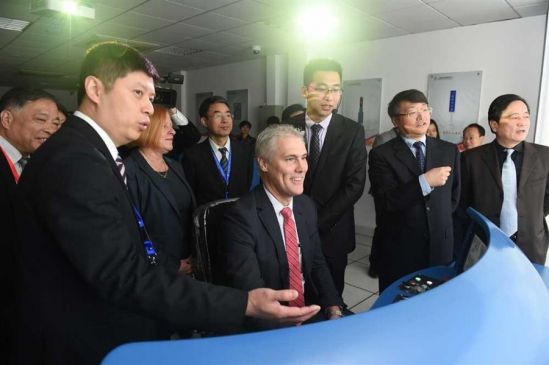David Hoey is in the driving seat for a visit to Shanghai Shentong Group, the operator of Shanghai’s Metro. Hoey said the city had shown it is capable of hosting the 2021 WorldSkills Competition. Which city is chosen as host will be announced in October.
A delegation from WorldSkills International (WSI) confirmed that Shanghai has the capability and capacity to host the WorldSkills Competition in 2021 after a two-day visit to the city.
The three delegation members, Simon Bartley, president of WSI, David Hoey, its chief executive officer, and Jane Stokie, director of the WorldSkills Competitions, said they were impressed by both the city’s vocational education and training system and the facilities in Shanghai.
“The people here are tremendous. They are friendly, helpful and obviously proud of where they live and work,” said Bartley. “What is also good is to see the skills there are here in the city. If Shanghai is representative of the skills among the young people and the workforce in China, it is no surprise to me.
“Firstly, China is getting better and better in the WorldSkills Competitions. And secondly, it has stepped out with its ambition to show the skills of China to the world by (offering to host) the WorldSkills Competition in 2021.”
Bartley also said that if Shanghai was successful in the bid, the participating countries would definitely have their skills improved. “If Shanghai is successful, what will happen is that China will not only want to host a great competition, it will want to do well in it,” he said. “So I think skills in China will continue accelerating in getting better between now and 2021.
“What’s interesting is that in the competition, everybody tries harder and that trying harder starts in preparation for the competition,” he added.
Hoey said Shanghai was capable of hosting the event and it was now a matter of the city’s government leaders to convince WSI members to support and vote for Shanghai over its rival — Basel in Switzerland — for the right to host the competition.
China was a young member of the WSI, having been accepted in 2010, Hoey said. Its joining was important to the organization as it gave WorldSkills an increased validity as a global organization. “We were international because we had probably 60 countries at that time,” he said. “But we now have Brazil, Russia, India, China and up to 77 countries.”
Hoey said that having been involved in WorldSkills, looking at the systems around the world, he could see China was a world-class player in skills, but at the same time, it also suffered the same problem of a lot of other countries, whereby going to university was seen as a better career move than going into schools emphasizing skills and technologies.
“It’s the skilled workers who create and generate the economic output,” he said. “The vocational education and training system in China is very good, but what you need is people going through that.
“What WorldSkills will generate for China is first of all attracting young people into the schools of skills and technologies, advocating and showcasing skills excellence and inspiring them to consider their career.”
At the same time, “by providing excellence in training to them, you create economic output, because the quality of these workers will ultimately create the quality of your products and services,” he added.
“Workers in the future will need different sets of skills on the basis of IT capabilities,” Hoey said.
“They will have to have more soft skills, not just the ability to do things with their hands, but the ability to think, create and solve problems. I think artificial intelligence is actually something that we shouldn’t be scared of, but is going to create a whole new width of business opportunities.”










